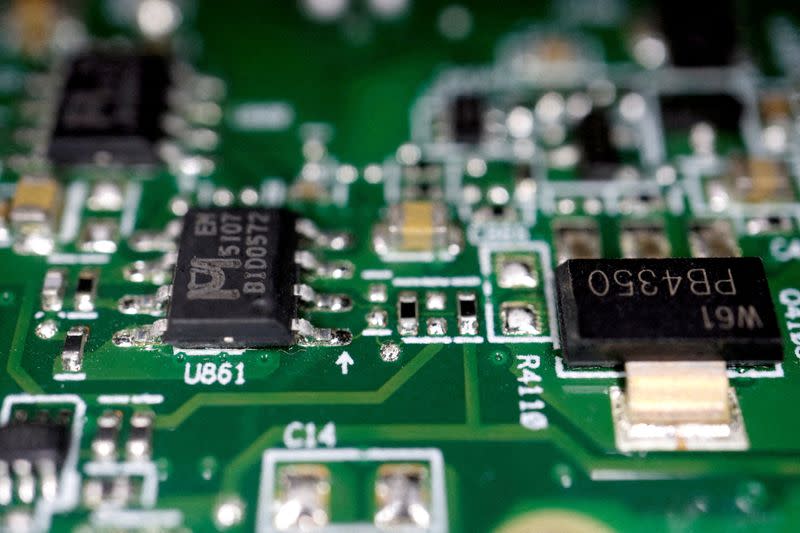Exclusive-Europe seeks industry views on China's older generation chips

By Toby Sterling and Nick Carey
AMSTERDAM/LONDON (Reuters) -The European Commission has begun canvassing the region's semiconductor industry for its views on China's expanded production of older generation computer chips, two sources familiar with the matter told Reuters.
The Commission, the EU executive, has sought feedback ahead of two voluntary surveys for the chip industry and major chip-using industrial firms that will be due in September.
A spokesperson on Friday confirmed the Commission had begun a "targeted consultation (with) the industry to assess further the use of legacy chips in supply chains."
In an emailed response to questions, the spokesperson said the EU and US may "develop joint or cooperative measures to address dependencies or distortionary effects."
It is unclear what action will result from the study but tensions between Brussels and Beijing are already rising as the European Union seeks to protect its industries from Chinese competition.
The Commission on Friday began imposing provisional tariffs of up to 37.6% on Chinese electric vehicles.
Trade analysts say the tariffs could be just the start of a toughened EU stance towards Beijing.
Chinese industry is investing heavily in expanding production of older chips, known as legacy chips, with help from state subsidies. That's in part because U.S.-led restrictions limit its access to buying or making more advanced computer chips.
In the short run, China's investment will lessen its dependence on foreign chips but Western governments are worried about the long-term implications, including potential oversupply of the chips needed for countless appliances and cars.
The Commission's antitrust chief Margrethe Vestager indicated in April the executive might investigate legacy chips after a meeting in Belgium with U.S. officials, including Commerce Secretary Gina Raimundo.
Also in April, the Commission released a 712-page report on the many layers of support it says the Chinese government provides to domestic firms.
The report included research into a wider range of industries including semiconductors, telecom equipment and renewable energy. Trade analysts interpreted it as a signal Brussels would be prepared to open more cases.
The new chip-focused surveys are a fact-finding mission, broader in scope than a security-focused survey sent by the U.S. Department of Commerce to U.S. firms, according to the two sources, who declined to be identified due to the sensitivity of the matter.
The Commission has sought feedback on draft questions including where industrial firms source their chips. It is seeking information on chip firms' products and pricing, as well as their estimates of the same information from their competitors, including their Chinese competitors.
For equipment suppliers such as Europe's biggest tech firm ASML, China's expansion of legacy chip production is an important source of revenue that mitigates U.S.-led export restrictions on more advanced technology.
For chipmakers such as Infineon of Germany, STMicroelectronics of France and NXP of the Netherlands, the picture is mixed: all are important makers of chips for cars and for electrical infrastructure. They face increasing Chinese competition, but also do business in China.
Europe's industrial, aerospace, automotive, health-tech and energy firms may be reluctant to disclose their use of Chinese legacy chips. They may also be uncertain where the chipsets they use are made, given the cross-border, multi-step nature of chipmaking and packaging.
German carmakers are opposed to tariffs on Chinese EVs, given their significant sales in China.
They have sought to diversify their chip suppliers to include production inside and outside China and Taiwan after costly shortages during the COVID-19 pandemic.
(Reporting by Toby Sterling, Nick Carey, Foo Yun Chee; Editing by Matt Scuffham, and Barbara Lewis)

 Yahoo Finance
Yahoo Finance 